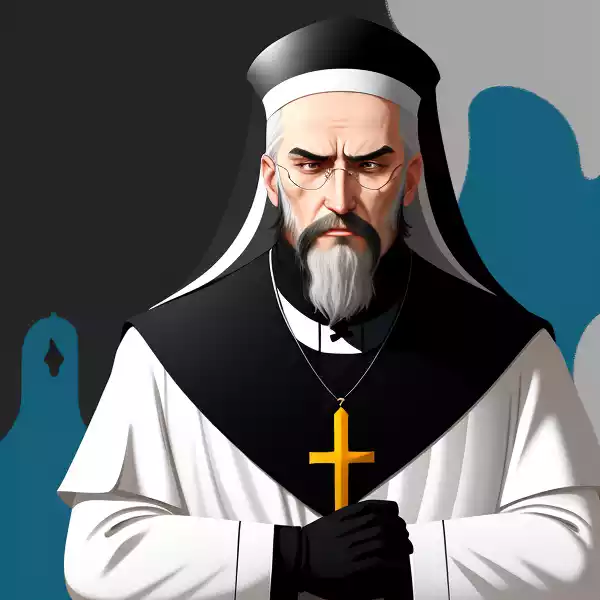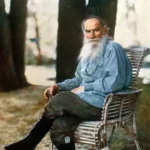 | |
Father Sergius | |
| Author | Leo Tolstoy |
|---|---|
| Published |
1864
|
| Language | English |
| Original Language | Russian |
| Nationality | Russian |
| Genre | Philosophical Fiction, Russian Literature |
1864 Short Story
Father Sergius
Father Sergius is an English Philosophical Fiction, Russian Literature short story by Russian writer Leo Tolstoy. It was first published in 1864.
Father Sergius
by Leo Tolstoy
I
In Petersburg in the eighteen-forties a surprising event occurred. An
officer of the Cuirassier Life Guards, a handsome prince who everyone
predicted would become aide-de-camp to the Emperor Nicholas I and have
a brilliant career, left the service, broke off his engagement to a
beautiful maid of honour, a favourite of the Empress’s, gave his small
estate to his sister, and retired to a monastery to become a monk.
This event appeared extraordinary and inexplicable to those who did not
know his inner motives, but for Prince Stepan Kasatsky himself it all
occurred so naturally that he could not imagine how he could have acted
otherwise.
His father, a retired colonel of the Guards, had died when Stepan was
twelve, and sorry as his mother was to part from her son, she entered
him at the Military College as her deceased husband had intended.
The widow herself, with her daughter, Varvara, moved to Petersburg to be
near her son and have him with her for the holidays.
The boy was distinguished both by his brilliant ability and by his
immense self-esteem. He was first both in his studies–especially in
mathematics, of which he was particularly fond–and also in drill and in
riding. Though of more than average height, he was handsome and agile,
and he would have been an altogether exemplary cadet had it not been for
his quick temper. He was remarkably truthful, and was neither dissipated
nor addicted to drink. The only faults that marred his conduct were
fits of fury to which he was subject and during which he lost control of
himself and became like a wild animal. He once nearly threw out of the
window another cadet who had begun to tease him about his collection
of minerals. On another occasion he came almost completely to grief
by flinging a whole dish of cutlets at an officer who was acting as
steward, attacking him and, it was said, striking him for having broken
his word and told a barefaced lie. He would certainly have been reduced
to the ranks had not the Director of the College hushed up the whole
matter and dismissed the steward.
By the time he was eighteen he had finished his College course and
received a commission as lieutenant in an aristocratic regiment of the
Guards.
The Emperor Nicholas Pavlovich (Nicholas I) had noticed him while he
was still at the College, and continued to take notice of him in the
regiment, and it was on this account that people predicted for him an
appointment as aide-de-camp to the Emperor. Kasatsky himself strongly
desired it, not from ambition only but chiefly because since his cadet
days he had been passionately devoted to Nicholas Pavlovich. The Emperor
had often visited the Military College and every time Kasatsky saw
that tall erect figure, with breast expanded in its military overcoat,
entering with brisk step, saw the cropped side-whiskers, the moustache,
the aquiline nose, and heard the sonorous voice exchanging greetings
with the cadets, he was seized by the same rapture that he experienced
later on when he met the woman he loved. Indeed, his passionate
adoration of the Emperor was even stronger: he wished to sacrifice
something–everything, even himself–to prove his complete devotion.
And the Emperor Nicholas was conscious of evoking this rapture and
deliberately aroused it. He played with the cadets, surrounded himself
with them, treating them sometimes with childish simplicity, sometimes
as a friend, and then again with majestic solemnity. After that affair
with the officer, Nicholas Pavlovich said nothing to Kasatsky, but when
the latter approached he waved him away theatrically, frowned, shook his
finger at him, and afterwards when leaving, said: ‘Remember that I know
everything. There are some things I would rather not know, but they
remain here,’ and he pointed to his heart.
When on leaving College the cadets were received by the Emperor, he did
not again refer to Kasatsky’s offence, but told them all, as was his
custom, that they should serve him and the fatherland loyally, that he
would always be their best friend, and that when necessary they might
approach him direct. All the cadets were as usual greatly moved, and
Kasatsky even shed tears, remembering the past, and vowed that he would
serve his beloved Tsar with all his soul.
When Kasatsky took up his commission his mother moved with her daughter
first to Moscow and then to their country estate. Kasatsky gave half his
property to his sister and kept only enough to maintain himself in the
expensive regiment he had joined.
To all appearance he was just an ordinary, brilliant young officer
of the Guards making a career for himself; but intense and complex
strivings went on within him. From early childhood his efforts had
seemed to be very varied, but essentially they were all one and the
same. He tried in everything he took up to attain such success and
perfection as would evoke praise and surprise. Whether it was his
studies or his military exercises, he took them up and worked at them
till he was praised and held up as an example to others. Mastering one
subject he took up another, and obtained first place in his studies. For
example, while still at College he noticed in himself an awkwardness in
French conversation, and contrived to master French till he spoke it
as well as Russian, and then he took up chess and became an excellent
player.
Apart from his main vocation, which was the service of his Tsar and
the fatherland, he always set himself some particular aim, and however
unimportant it was, devoted himself completely to it and lived for it
until it was accomplished. And as soon as it was attained another
aim would immediately present itself, replacing its predecessor. This
passion for distinguishing himself, or for accomplishing something
in order to distinguish himself, filled his life. On taking up his
commission he set himself to acquire the utmost perfection in knowledge
of the service, and very soon became a model officer, though still with
the same fault of ungovernable irascibility, which here in the service
again led him to commit actions inimical to his success. Then he took to
reading, having once in conversation in society felt himself deficient
in general education–and again achieved his purpose. Then, wishing
to secure a brilliant position in high society, he learnt to dance
excellently and very soon was invited to all the balls in the best
circles, and to some of their evening gatherings. But this did not
satisfy him: he was accustomed to being first, and in this society was
far from being so.
The highest society then consisted, and I think always consist, of
four sorts of people: rich people who are received at Court, people
not wealthy but born and brought up in Court circles, rich people who
ingratiate themselves into the Court set, and people neither rich nor
belonging to the Court but who ingratiate themselves into the first and
second sets.
Kasatsky did not belong to the first two sets, but was readily welcomed
in the others. On entering society he determined to have relations with
some society lady, and to his own surprise quickly accomplished this
purpose. He soon realized, however, that the circles in which he moved
were not the highest, and that though he was received in the highest
spheres he did not belong to them. They were polite to him, but showed
by their whole manner that they had their own set and that he was not of
it. And Kasatsky wished to belong to that inner circle. To attain that
end it would be necessary to be an aide-de-camp to the Emperor–which
he expected to become–or to marry into that exclusive set, which he
resolved to do. And his choice fell on a beauty belonging to the
Court, who not merely belonged to the circle into which he wished to be
accepted, but whose friendship was coveted by the very highest people
and those most firmly established in that highest circle. This was
Countess Korotkova. Kasatsky began to pay court to her, and not merely
for the sake of his career. She was extremely attractive and he soon
fell in love with her. At first she was noticeably cool towards him,
but then suddenly changed and became gracious, and her mother gave him
pressing invitations to visit them. Kasatsky proposed and was accepted.
He was surprised at the facility with which he attained such happiness.
But though he noticed something strange and unusual in the behaviour
towards him of both mother and daughter, he was blinded by being
so deeply in love, and did not realize what almost the whole town
knew–namely, that his fiancee had been the Emperor Nicholas’s mistress
the previous year.
Two weeks before the day arranged for the wedding, Kasatsky was at
Tsarskoe Selo at his fiancee’s country place. It was a hot day in May.
He and his betrothed had walked about the garden and were sitting on
a bench in a shady linden alley. Mary’s white muslin dress suited her
particularly well, and she seemed the personification of innocence and
love as she sat, now bending her head, now gazing up at the very tall
and handsome man who was speaking to her with particular tenderness and
self-restraint, as if he feared by word or gesture to offend or sully
her angelic purity.
Kasatsky belonged to those men of the eighteen-forties (they are now no
longer to be found) who while deliberately and without any conscientious
scruples condoning impurity in themselves, required ideal and angelic
purity in their women, regarded all unmarried women of their circle as
possessed of such purity, and treated them accordingly. There was much
that was false and harmful in this outlook, as concerning the laxity the
men permitted themselves, but in regard to the women that old-fashioned
view (sharply differing from that held by young people to-day who see in
every girl merely a female seeking a mate) was, I think, of value. The
girls, perceiving such adoration, endeavoured with more or less success
to be goddesses.
Such was the view Kasatsky held of women, and that was how he regarded
his fiancee. He was particularly in love that day, but did not
experience any sensual desire for her. On the contrary he regarded her
with tender adoration as something unattainable.
He rose to his full height, standing before her with both hands on his
sabre.
‘I have only now realized what happiness a man can experience! And it is
you, my darling, who have given me this happiness,’ he said with a timid
smile.
Endearments had not yet become usual between them, and feeling himself
morally inferior he felt terrified at this stage to use them to such an
angel.
‘It is thanks to you that I have come to know myself. I have learnt that
I am better than I thought.’
‘I have known that for a long time. That was why I began to love you.’
Nightingales trilled near by and the fresh leafage rustled, moved by a
passing breeze.
He took her hand and kissed it, and tears came into his eyes.
She understood that he was thanking her for having said she loved him.
He silently took a few steps up and down, and then approached her again
and sat down.
‘You know . . . I have to tell you . . . I was not disinterested when I
began to make love to you. I wanted to get into society; but later . . .
how unimportant that became in comparison with you–when I got to know
you. You are not angry with me for that?’
She did not reply but merely touched his hand. He understood that this
meant: ‘No, I am not angry.’
‘You said . . .’ He hesitated. It seemed too bold to say. ‘You said that
you began to love me. I believe it–but there is something that troubles
you and checks your feeling. What is it?’
‘Yes–now or never!’ thought she. ‘He is bound to know of it anyway. But
now he will not forsake me. Ah, if he should, it would be terrible!’ And
she threw a loving glance at his tall, noble, powerful figure. She loved
him now more than she had loved the Tsar, and apart from the Imperial
dignity would not have preferred the Emperor to him.
‘Listen! I cannot deceive you. I have to tell you. You ask what it is?
It is that I have loved before.’
She again laid her hand on his with an imploring gesture. He was silent.
‘You want to know who it was? It was–the Emperor.’
‘We all love him. I can imagine you, a schoolgirl at the Institute . . .’
‘No, it was later. I was infatuated, but it passed . . . I must tell
you . . .’
‘Well, what of it?’
‘No, it was not simply–‘ She covered her face with her hands.
‘What? You gave yourself to him?’
She was silent.
‘His mistress?’
She did not answer.
He sprang up and stood before her with trembling jaws, pale as death. He
now remembered how the Emperor, meeting him on the Nevsky, had amiably
congratulated him.
‘O God, what have I done! Stiva!’
‘Don’t touch me! Don’t touch me! Oh, how it pains!’
He turned away and went to the house. There he met her mother.
‘What is the matter, Prince? I . . .’ She became silent on seeing his
face. The blood had suddenly rushed to his head.
‘You knew it, and used me to shield them! If you weren’t a woman . . . !’
he cried, lifting his enormous fist, and turning aside he ran away.
Had his fiancee’s lover been a private person he would have killed him,
but it was his beloved Tsar.
Next day he applied both for furlough and his discharge, and professing
to be ill, so as to see no one, he went away to the country.
He spent the summer at his village arranging his affairs. When summer
was over he did not return to Petersburg, but entered a monastery and
there became a monk.
His mother wrote to try to dissuade him from this decisive step, but
he replied that he felt God’s call which transcended all other
considerations. Only his sister, who was as proud and ambitious as he,
understood him.
She understood that he had become a monk in order to be above those who
considered themselves his superiors. And she understood him correctly.
By becoming a monk he showed contempt for all that seemed most important
to others and had seemed so to him while he was in the service, and
he now ascended a height from which he could look down on those he had
formerly envied. . . . But it was not this alone, as his sister Varvara
supposed, that influenced him. There was also in him something else–a
sincere religious feeling which Varvara did not know, which intertwined
itself with the feeling of pride and the desire for pre-eminence,
and guided him. His disillusionment with Mary, whom he had thought
of angelic purity, and his sense of injury, were so strong that they
brought him to despair, and the despair led him–to what? To God, to his
childhood’s faith which had never been destroyed in him.
II
Kasatsky entered the monastery on the feast of the Intercession of the
Blessed Virgin. The Abbot of that monastery was a gentleman by birth, a
learned writer and a starets, that is, he belonged to that succession
of monks originating in Walachia who each choose a director and teacher
whom they implicitly obey. This Superior had been a disciple of the
starets Ambrose, who was a disciple of Makarius, who was a disciple of
the starets Leonid, who was a disciple of Paussy Velichkovsky.
To this Abbot Kasatsky submitted himself as to his chosen director. Here
in the monastery, besides the feeling of ascendency over others that
such a life gave him, he felt much as he had done in the world: he found
satisfaction in attaining the greatest possible perfection outwardly
as well as inwardly. As in the regiment he had been not merely an
irreproachable officer but had even exceeded his duties and widened the
borders of perfection, so also as a monk he tried to be perfect, and was
always industrious, abstemious, submissive, and meek, as well as
pure both in deed and in thought, and obedient. This last quality in
particular made life far easier for him. If many of the demands of life
in the monastery, which was near the capital and much frequented, did
not please him and were temptations to him, they were all nullified by
obedience: ‘It is not for me to reason; my business is to do the task
set me, whether it be standing beside the relics, singing in the choir,
or making up accounts in the monastery guest-house.’ All possibility of
doubt about anything was silenced by obedience to the starets. Had
it not been for this, he would have been oppressed by the length and
monotony of the church services, the bustle of the many visitors, and
the bad qualities of the other monks. As it was, he not only bore it
all joyfully but found in it solace and support. ‘I don’t know why it is
necessary to hear the same prayers several times a day, but I know that
it is necessary; and knowing this I find joy in them.’ His director told
him that as material food is necessary for the maintenance of the life
of the body, so spiritual food–the church prayers–is necessary for
the maintenance of the spiritual life. He believed this, and though the
church services, for which he had to get up early in the morning, were
a difficulty, they certainly calmed him and gave him joy. This was the
result of his consciousness of humility, and the certainty that whatever
he had to do, being fixed by the starets, was right.
The interest of his life consisted not only in an ever greater and
greater subjugation of his will, but in the attainment of all the
Christian virtues, which at first seemed to him easily attainable. He
had given his whole estate to his sister and did not regret it, he had
no personal claims, humility towards his inferiors was not merely easy
for him but afforded him pleasure. Even victory over the sins of the
flesh, greed and lust, was easily attained. His director had specially
warned him against the latter sin, but Kasatsky felt free from it and
was glad.
One thing only tormented him–the remembrance of his fiancee; and not
merely the remembrance but the vivid image of what might have been.
Involuntarily he recalled a lady he knew who had been a favourite of the
Emperor’s, but had afterwards married and become an admirable wife and
mother. The husband had a high position, influence and honour, and a
good and penitent wife.
In his better hours Kasatsky was not disturbed by such thoughts, and
when he recalled them at such times he was merely glad to feel that the
temptation was past. But there were moments when all that made up his
present life suddenly grew dim before him, moments when, if he did not
cease to believe in the aims he had set himself, he ceased to see them
and could evoke no confidence in them but was seized by a remembrance
of, and–terrible to say–a regret for, the change of life he had made.
The only thing that saved him in that state of mind was obedience and
work, and the fact that the whole day was occupied by prayer. He went
through the usual forms of prayer, he bowed in prayer, he even prayed
more than usual, but it was lip-service only and his soul was not in it.
This condition would continue for a day, or sometimes for two days, and
would then pass of itself. But those days were dreadful. Kasatsky felt
that he was neither in his own hands nor in God’s, but was subject
to something else. All he could do then was to obey the starets, to
restrain himself, to undertake nothing, and simply to wait. In general
all this time he lived not by his own will but by that of the starets,
and in this obedience he found a special tranquillity.
So he lived in his first monastery for seven years. At the end of the
third year he received the tonsure and was ordained to the priesthood by
the name of Sergius. The profession was an important event in his inner
life. He had previously experienced a great consolation and spiritual
exaltation when receiving communion, and now when he himself officiated,
the performance of the preparation filled him with ecstatic and deep
emotion. But subsequently that feeling became more and more deadened,
and once when he was officiating in a depressed state of mind he felt
that the influence produced on him by the service would not endure. And
it did in fact weaken till only the habit remained.
In general in the seventh year of his life in the monastery Sergius grew
weary. He had learnt all there was to learn and had attained all there
was to attain, there was nothing more to do and his spiritual drowsiness
increased. During this time he heard of his mother’s death and his
sister Varvara’s marriage, but both events were matters of indifference
to him. His whole attention and his whole interest were concentrated on
his inner life.
In the fourth year of his priesthood, during which the Bishop had been
particularly kind to him, the starets told him that he ought not to
decline it if he were offered an appointment to higher duties. Then
monastic ambition, the very thing he had found so repulsive in other
monks, arose within him. He was assigned to a monastery near the
metropolis. He wished to refuse but the starets ordered him to accept
the appointment. He did so, and took leave of the starets and moved to
the other monastery.
The exchange into the metropolitan monastery was an important event in
Sergius’s life. There he encountered many temptations, and his whole
will-power was concentrated on meeting them.
In the first monastery, women had not been a temptation to him, but
here that temptation arose with terrible strength and even took definite
shape. There was a lady known for her frivolous behaviour who began to
seek his favour. She talked to him and asked him to visit her. Sergius
sternly declined, but was horrified by the definiteness of his desire.
He was so alarmed that he wrote about it to the starets. And in
addition, to keep himself in hand, he spoke to a young novice and,
conquering his sense of shame, confessed his weakness to him, asking him
to keep watch on him and not let him go anywhere except to service and
to fulfil his duties.
Besides this, a great pitfall for Sergius lay in the fact of his extreme
antipathy to his new Abbot, a cunning worldly man who was making a
career for himself in the Church. Struggle with himself as he might, he
could not master that feeling. He was submissive to the Abbot, but in
the depths of his soul he never ceased to condemn him. And in the second
year of his residence at the new monastery that ill-feeling broke out.
The Vigil service was being performed in the large church on the eve of
the feast of the Intercession of the Blessed Virgin, and there were many
visitors. The Abbot himself was conducting the service. Father Sergius
was standing in his usual place and praying: that is, he was in that
condition of struggle which always occupied him during the service,
especially in the large church when he was not himself conducting the
service. This conflict was occasioned by his irritation at the presence
of fine folk, especially ladies. He tried not to see them or to notice
all that went on: how a soldier conducted them, pushing the
common people aside, how the ladies pointed out the monks to one
another–especially himself and a monk noted for his good looks. He
tried as it were to keep his mind in blinkers, to see nothing but
the light of the candles on the altar-screen, the icons, and those
conducting the service. He tried to hear nothing but the prayers
that were being chanted or read, to feel nothing but self-oblivion in
consciousness of the fulfilment of duty–a feeling he always experienced
when hearing or reciting in advance the prayers he had so often heard.
So he stood, crossing and prostrating himself when necessary, and
struggled with himself, now giving way to cold condemnation and now to
a consciously evoked obliteration of thought and feeling. Then the
sacristan, Father Nicodemus–also a great stumbling-block to Sergius
who involuntarily reproached him for flattering and fawning on the
Abbot–approached him and, bowing low, requested his presence behind the
holy gates. Father Sergius straightened his mantle, put on his biretta,
and went circumspectly through the crowd.
‘Lise, regarde a droite, c’est lui!’ he heard a woman’s voice say.
‘Ou, ou? Il n’est pas tellement beau.’
He knew that they were speaking of him. He heard them and, as always
at moments of temptation, he repeated the words, ‘Lead us not into
temptation,’ and bowing his head and lowering his eyes went past the
ambo and in by the north door, avoiding the canons in their cassocks who
were just then passing the altar-screen. On entering the sanctuary he
bowed, crossing himself as usual and bending double before the icons.
Then, raising his head but without turning, he glanced out of the corner
of his eye at the Abbot, whom he saw standing beside another glittering
figure.
The Abbot was standing by the wall in his vestments. Having freed his
short plump hands from beneath his chasuble he had folded them over
his fat body and protruding stomach, and fingering the cords of his
vestments was smilingly saying something to a military man in the
uniform of a general of the Imperial suite, with its insignia
and shoulder-knots which Father Sergius’s experienced eye at once
recognized. This general had been the commander of the regiment in which
Sergius had served. He now evidently occupied an important position, and
Father Sergius at once noticed that the Abbot was aware of this and that
his red face and bald head beamed with satisfaction and pleasure. This
vexed and disgusted Father Sergius, the more so when he heard that the
Abbot had only sent for him to satisfy the general’s curiosity to see a
man who had formerly served with him, as he expressed it.
‘Very pleased to see you in your angelic guise,’ said the general,
holding out his hand. ‘I hope you have not forgotten an old comrade.’
The whole thing–the Abbot’s red, smiling face amid its fringe of grey,
the general’s words, his well-cared-for face with its self-satisfied
smile and the smell of wine from his breath and of cigars from his
whiskers–revolted Father Sergius. He bowed again to the Abbot and said:
‘Your reverence deigned to send for me?’–and stopped, the whole
expression of his face and eyes asking why.
‘Yes, to meet the General,’ replied the Abbot.
‘Your reverence, I left the world to save myself from temptation,’ said
Father Sergius, turning pale and with quivering lips. ‘Why do you expose
me to it during prayers and in God’s house?’
‘You may go! Go!’ said the Abbot, flaring up and frowning.
Next day Father Sergius asked pardon of the Abbot and of the brethren
for his pride, but at the same time, after a night spent in prayer, he
decided that he must leave this monastery, and he wrote to the starets
begging permission to return to him. He wrote that he felt his weakness
and incapacity to struggle against temptation without his help and
penitently confessed his sin of pride. By return of post came a letter
from the starets, who wrote that Sergius’s pride was the cause of all
that had happened. The old man pointed out that his fits of anger were
due to the fact that in refusing all clerical honours he humiliated
himself not for the sake of God but for the sake of his pride. ‘There
now, am I not a splendid man not to want anything?’ That was why he
could not tolerate the Abbot’s action. ‘I have renounced everything for
the glory of God, and here I am exhibited like a wild beast!’ ‘Had you
renounced vanity for God’s sake you would have borne it. Worldly pride
is not yet dead in you. I have thought about you, Sergius my son, and
prayed also, and this is what God has suggested to me. At the Tambov
hermitage the anchorite Hilary, a man of saintly life, has died. He had
lived there eighteen years. The Tambov Abbot is asking whether there is
not a brother who would take his place. And here comes your letter. Go
to Father Paissy of the Tambov Monastery. I will write to him about you,
and you must ask for Hilary’s cell. Not that you can replace Hilary, but
you need solitude to quell your pride. May God bless you!’
Sergius obeyed the starets, showed his letter to the Abbot, and having
obtained his permission, gave up his cell, handed all his possessions
over to the monastery, and set out for the Tambov hermitage.
There the Abbot, an excellent manager of merchant origin, received
Sergius simply and quietly and placed him in Hilary’s cell, at first
assigning to him a lay brother but afterwards leaving him alone, at
Sergius’s own request. The cell was a dual cave, dug into the hillside,
and in it Hilary had been buried. In the back part was Hilary’s grave,
while in the front was a niche for sleeping, with a straw mattress, a
small table, and a shelf with icons and books. Outside the outer door,
which fastened with a hook, was another shelf on which, once a day, a
monk placed food from the monastery.
And so Sergius became a hermit.
III
At Carnival time, in the sixth year of Sergius’s life at the hermitage,
a merry company of rich people, men and women from a neighbouring town,
made up a troyka-party, after a meal of carnival-pancakes and wine. The
company consisted of two lawyers, a wealthy landowner, an officer, and
four ladies. One lady was the officer’s wife, another the wife of
the landowner, the third his sister–a young girl–and the fourth a
divorcee, beautiful, rich, and eccentric, who amazed and shocked the
town by her escapades.
The weather was excellent and the snow-covered road smooth as a floor.
They drove some seven miles out of town, and then stopped and consulted
as to whether they should turn back or drive farther.
‘But where does this road lead to?’ asked Makovkina, the beautiful
divorcee.
‘To Tambov, eight miles from here,’ replied one of the lawyers, who was
having a flirtation with her.
‘And then where?’
‘Then on to L—-, past the Monastery.’
‘Where that Father Sergius lives?’
‘Yes.’
‘Kasatsky, the handsome hermit?’
‘Yes.’
‘Mesdames et messieurs, let us drive on and see Kasatsky! We can stop at
Tambov and have something to eat.’
‘But we shouldn’t get home to-night!’
‘Never mind, we will stay at Kasatsky’s.’
‘Well, there is a very good hostelry at the Monastery. I stayed there
when I was defending Makhin.’
‘No, I shall spend the night at Kasatsky’s!’
‘Impossible! Even your omnipotence could not accomplish that!’
‘Impossible? Will you bet?’
‘All right! If you spend the night with him, the stake shall be whatever
you like.’
‘A DISCRETION!’
‘But on your side too!’
‘Yes, of course. Let us drive on.’
Vodka was handed to the drivers, and the party got out a box of pies,
wine, and sweets for themselves. The ladies wrapped up in their white
dogskins. The drivers disputed as to whose troyka should go ahead, and
the youngest, seating himself sideways with a dashing air, swung his
long knout and shouted to the horses. The troyka-bells tinkled and the
sledge-runners squeaked over the snow.
The sledge swayed hardly at all. The shaft-horse, with his tightly bound
tail under his decorated breechband, galloped smoothly and briskly; the
smooth road seemed to run rapidly backwards, while the driver dashingly
shook the







